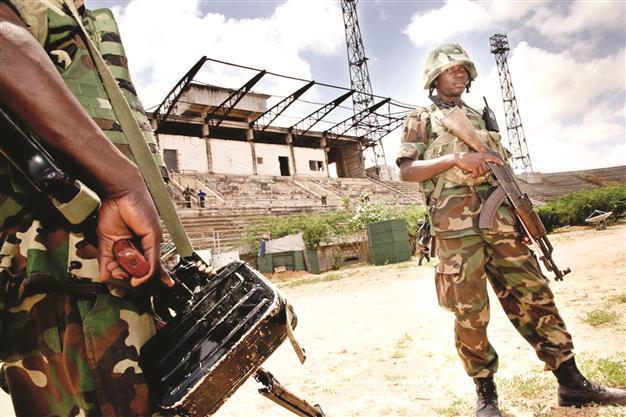Football back in Africa’s most abused stadium
James M. Dorsey ISTANBUL - Hürriyet Daily News

Turkish Red Crescent built a football field in Mogadishu to help the country’s nity efforts and organized a tournament last July. The smaller photo shows two soldiers standing guard at the Mogadishu Stadium.
In a sign of improved security in Somalia, African Union (AU) troops will return Mogadishu Stadium, the most abused sports facility in a region with a history of battered stadiums, to the Somali Football Federation (SFF).
The AU decision highlights the recent, significant setbacks suffered by al-Shabaab, the al-Qaeda-linked Islamist militia that banned football alongside bras, music, movies, moustaches and gold fillings during the years that it controlled large chunks of football-crazy Somalia, including the stadium.
It also celebrates the SFF’s leading role in resisting al-Shabaab’s austere lifestyle based on an interpretation of Islamic law that is contested even in jihadist circles and a successful campaign to win back child soldiers by offering them a future in football.
The SFF hopes to host a football tournament in December for the first time in more than two decades in the 70,000-seat stadium, which was built with Chinese aid in the 1970s and once was the region’s largest sport facility.
Losing controlThe tournament would symbolize Somalia’s fragile retreat from the brink following a string of military defeats by al-Shabaab at the hands of the African peacekeepers and the Somali military. Al-Shabaab last month lost control of its last urban outpost but still has a foothold in southern and central parts of the country. In September Hassan Sheikh Mohamud became the first Somali president to be elected by Parliament and inaugurated since the country slipped into civil war in 1991.
Mogadishu Stadium, occupying strategic ground in the northern part of the city, has since been controlled by a host of militias, including al-Shabaab, which used it for training and public executions until last year when the AU established its command headquarters in the facility.
As a result, the facility topped the list of abuse of stadiums that bear the scars of the battles fought on their terrain in a swath of land stretching from the Gulf to the Atlantic coast of Africa in which militants and autocrats use stadiums for their own purposes.
In Iraq, deposed dictator Saddam Hussein’s sadistic son Uday humiliated national football team players in Baghdad’s Stadium for the People when they failed to perform. U.S. and Iraqi forces discovered mass graves in several Iraqi stadiums following the overthrow of Saddam.
In the last 20 months, Syrian security forces have herded anti-government protesters into stadiums in Latakia, Daraa and Baniyas. The use of the stadiums evoked memories of the government’s 1982 assault on the Syrian city of Hama to crush an earlier uprising by the Muslim Brotherhood in which at least 10,000 people were killed. A 1983 Amnesty International report charged that the city’s stadium was used at the time to detain large numbers of residents who were left for days in the open without food or shelter.
Christian militia men responsible for the 1982 massacres in the Beirut Palestinian refugee camps of Sabra and Shatilla, to which Israeli invasion forces turned a blind eye, converted a local football pitch into their staging ground.
Egyptian stadiums were for years the venue of pitched battles between security forces and militant football fans who refused to concede control of a space they considered their own to a regime they increasingly saw as brutal and corrupt.
The return of the ground in Mogadishu follows a meeting in the stadium between commanders of the African Union Peacekeepers in Somalia (AMISOM) and SFF officials led by Secretary-General Abdi Qani Said Arab.
Football unites“In December 2010 we held the first edition of a regional football tournament in more than 20 years and that tournament yielded positive results in terms of disarming child soldiers, creating friendship among people and spreading football throughout the country,” Arab said after the meeting.
Arab was referring to an SFF campaign backed by world football body FIFA and local businessmen under the slogan “Put down the gun, pick up the ball” that threw down a gauntlet to jihadists by luring child soldiers away from them.
“However difficult our situation is, we believe football can play a major role in helping peace and stability prevail in our country, and that is what our federation has long been striving to attain. Football is here to stay, not only as a game to be played but as a catalyst for peace and harmony in society,” Shafi’i Moyhaddin, one of the driving forces behind the campaign, said in an interview last year.
Mahad Mohammed was one of hundreds of children the association assisted in swapping jihad for football, the only institution that competed with radical Islam in offering young populations a prospect of a better life.
“People were afraid of me when I had an AK-47; now they love and congratulate me. I thank the football federation, they helped me. I just drifted into being a soldier; it is hard to say how it happened. Some friends of mine ended up being fighters and they used to tell me that it was a good and exciting life and much better than doing nothing or being on the streets. After I spent some time doing that, I understood that it wasn’t like that at all and I was happy to get out,” Mahad said.
